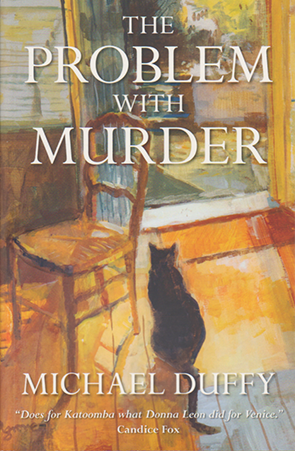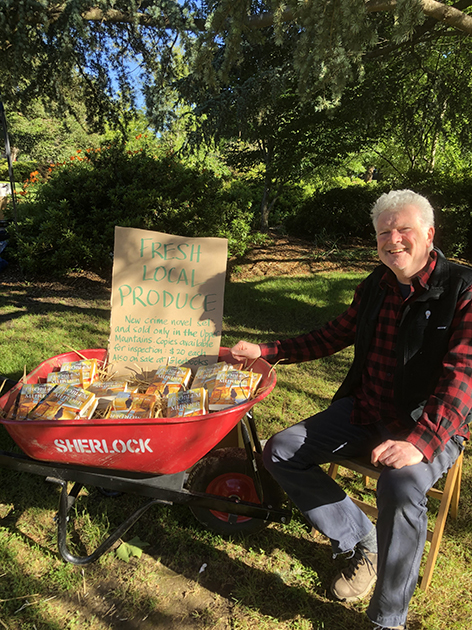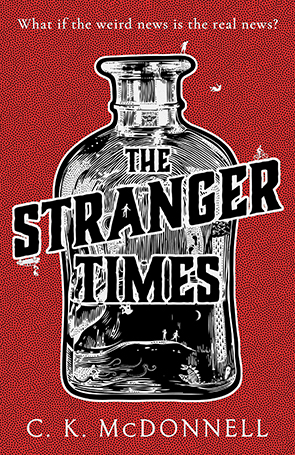
- Thankyou, Michael for speaking to the Reading Project. You’ve written several crime novels. What drew you to the crime genre?
- You have another series (Nicholas Troy series) set in Sydney which is a more conventional police procedural. The first opens with a body falling from a high rise building into a police car. It has a very different feel to The Problem with Murder. What did you try to do differently with this book?
- At one point (p.28) Bella thinks that she, like other serious journalists, looked down on crime stories. Given your background as crime writer for the SMH, was this a self-deprecating joke, or the reality of relative ‘rank’ in journalist circles?
- Paul has difficulty adjusting to his new posting. Do you think there are differences between Sydney and Mountains communities?
- Paul Ruel seems to be a very flawed detective. For all his big city reputation, he seems to make a lot of bad decisions in Katoomba. Was this to make the character easier to empathise with? Or are his issues meant to reflect the systemic problems that he faces?
- A note at the front of your book makes a clear delineation between your fiction and reality: the Katoomba police and the local newspaper. Without mentioning names, were Paul Ruel and Bella Greaves based on real people?
- Domestic violence is an important factor in your story. To what extent do you think your book reflects the reality of communities like Katoomba, and how do you account for that?
- There are themes of alienation, exclusion and concealment running through your book, as well as Paul’s son, Sean, who collaborates with ‘friends’ on a computer game. Do you see alienation as a state of modernity?
- What was behind your limiting the distribution of this book to the Upper Mountains bookstores?
- The Problem with Murder at times had a rather gothic feel to it, with the use of location and atmosphere. Do you think there is the potential for there to be a ‘Blue Mountains Gothic’, similar to Tasmanian Gothic?
- The idea that civilisation breaks down the farther you get from the centre (like Marlowe travelling up the Congo in Heart of Darkness) is an old one. What importance do you place on setting?
- Now that you’ve written a very different paced book, do you think you will return to a more conventional crime fiction with more Troy novels?
- Is there likely to be a Bella Greaves / Paul Ruel series?
First can I say thank you very much for your interest in my unusual book.
I was always a writer. As a court reporter for the Sydney Morning Herald, I came across some people and stories that called out for more extended treatment. I wrote two true crime books, and then moved into fiction, because I wanted to portray more of what went on in the hearts and minds of people involved in these stories. In real life they're often still traumatised and not very reflective, but I felt I'd built up some understanding of their situations that I wanted to put down on paper.
That was an attempt to portray real police work, and police, accurately. For that reason, and because of his youth, Nick Troy was deliberately quite a limited character. I think the Bella Greaves books - I hope to do a sequel this year - are more thoughtful. Having Bella in them as well as the detective Paul Ruel allows a richer level of reflection and description, which is important to me now.
Crime reporting has traditionally been considered tabloid and avoided by serious journalists, and their readers. The crime reporting of the Daily Telegraph in Sydney has always been superior to that of the Sydney Morning Herald. That is changing, for example we've seen ABC TV and the broadsheet Australian newspaper get seriously into crime over the past five years. I'm not sure why that is, but I know some serious reporters still won't touch crime. It's considered lurid and devoid of social or cultural purpose.
Detectives in the Homicide Squad in Sydney often talk or even boast about being "in the A grade". The other specialist squads there, such as Gangs and Sex Crimes, would be the B grade, followed by the rest. It's all about the level of crime they get to deal with, and that's why Paul feels aggrieved, because there are so few professional criminals - or crimes - in the Mountains for him to deal with. Partly that's due to the small population, and partly it's because of the sort of people who live here. We're fortunate not to have social problems to the same extent as some parts of Sydney, which produce a lot of crime.
I don't say this in the book, but to my mind, Paul's suffering PTSD from being betrayed, as he sees it, by his bosses in Sydney, and then sent into exile. Like many cops, the police force became his whole moral and social and cultural world, and when that let him down, he fell hard. In this book he's still picking himself up. I'm very sympathetic to him.
Nothing in the book or these reflections applies to the real Blue Mountains police. So far as I know, they're thoroughly decent people doing a fine job.
Like most characters in novels, mine are composites, based on a lot of real people. Bella, as someone around 60 years old, is partly a meditation on the modern experience of ageing, as it affects people I know. I was keen to show an older person who is still more than capable of doing important things professionally. I don't think our society is doing a good job in harnessing all the energy and creativity going begging in healthy older people. Bella is a role model!
It's a huge problem in every suburb and community. I assume it's always been so, we just didn't do as much about it before. I very much want in my crime novels to reflect reality, and if you talk to ordinary cops, that's their reality. For me, crime novels should be real and respect their subject matter. The idea of writing - and reading - crime for simple entertainment is not one I feel at all comfortable with.
Yes, I think social media (which is not media at all) reduces the ability to concentrate, meaning people are less able to read books or even long answers such as this! More generally, I think democracy is based on (real) media, and as that media diminishes, so too does democracy.
After the fires two years ago, some friends and I got together to see what we could do to help the local economy recover. Someone who worked in a bookstore said they needed local content to sell to tourists, and so I decided to write this book. Given that was its purpose, I felt no reason to sell it anywhere else. I also liked the idea of a book available only in shops mentioned in the text. I couldn't find a publisher prepared to embrace this rather unusual vision, so I published it myself! I'm grateful to Gleebooks, Little Lost Bookshop, Megalong and Lamdha Books for selling it. I think I'll try to add a few more stores (in the Mountains) for the next book, for commercial reasons.
I'm not sure exactly what the term 'Gothic' means. I am very interested in including anything unique to the Mountains, from weather to landscape to strange stories. I want to celebrate all this, but more importantly, I believe this sort of thing makes a region real, at least for me. I think Aboriginal people express this in their concept of 'songlines', not that I claim any expertise in that area. But writing and reading about the place where I live is very important to me.
I think the interesting thing about smaller communities is that people in them are forced to deal with a wider range of other people than they are in a city, where people tend to isolate themselves with others like themselves, whether at work or home. (Obviously Sydney in total has a wider range of people than the Mountains, but down there, no one person actually experiences that breadth.) This is another of the ways the Mountains setting is important for me.
No. I'm very keen to write, and publish, more Bella Greaves books. I used to be a publisher and I'm enjoying doing a little of it again, and the unusual experience of publishing to a community where I know many of the booksellers and readers. I set up a store at the Blackheath Growers Market in December, and it was fun.
Yes, I'm glad to say a few of the shops have asked for one. The Strange Death of Paul Ruel will appear in November 2022, at all good bookstores - so long as they're in the Blue Mountains! My wife Alex Snellgrove did the cover for The Problem with Murder, and people liked the picture and the cat a lot. Alex will do the next cover, and perhaps some cat cards.
The Problem with Murder is available over the counter only in the Blue Mountains, but you can order it online:
- The Little Lost Bookshop, Katoomba
- Megalong Books, Luera
- Lamdha Books, Wentworth Falls


























































Michael Duffy is a former journalist for the Sydney Morning Herald and the author of The Problem with Murder, set in the Blue Mountains west of Sydney where we live. It is available only from the Blue Mountains bookstores featured in the book (and online).
Michael Duffy contacted the Reading Project after we showed an interest in his book. Since then we have reviewed it and made a short video, featured on YouTube. Michael agreed to answer some questions for this website.